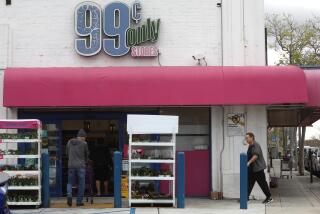Report of Possible Bankruptcy Filing Denied : British to Revive U.S. Strategy at Liquor Barn
- Share via
SAN FRANCISCO — The British-owned Liquor Barn chain, only a year after it was acquired from Safeway, is shifting its marketing strategy back to the American original, says the company’s new chief executive.
“As a game plan, we’ve adopted the view that there was nothing wrong with the old Liquor Barn’s strategy,” the California chain’s John Thompson said Tuesday. “Liquor Barn has always been a K mart of the wine and spirits retailing industry, and we’re not turning it into a Nordstrom,” Johnson said.
London-based Majestic Wine Warehouses, which had become the largest liquor discount retailer in the United States when it acquired Liquor Barn from Safeway in mid-1987 for $103 million, had tried to take Liquor Barn upscale by “de-supermarketizing” the stores; shrinking inventories; sharply cutting back the product lineup and expanding service.
“We’re going to get rid of these miles and miles of supermarket shelving,” Majestic managing director Esme Johnstone had announced in criticizing Safeway’s format.
However, in July, underscoring the marketing error, the chain’s new owners replaced their British management team with experienced American managers. Thompson is a former Atlanta executive whose specialty retailing company grossed $130 million in annual sales.
Of a published report that Liquor Barn is looking for a hefty infusion of cash and might file for Chapter 11 protection under the U.S. Bankruptcy Code, he said: “We have not considered filing at this time . . . the company intends to continue growth and improving our operations.”
Meantime, Johnson said, Liquor Barn’s new team has cut between $3 million and $4 million in overhead and sold or closed all its 18 Arizona stores, plus seven in California. The company, which had 104 stores when it was acquired, had planned to add at least 70 new stores and go public by 1992.
The chain reportedly owes more than $1 million alone to a San Francisco Bay Area distributor, is on a cash-only basis with some distributors and is no longer doing business with San Francisco wine broker Stoneman & Heath.
One of the distributors sent scrambling for alternate business just before the crucial Christmas season said: “We do 30% or 40% of our business in November and December, and this situation leaves us wondering what will happen. After all, Liquor Barn does move a lot of product.”
Safeway sold off Liquor Barn and many of its supermarkets to reduce the debt created by a $4.3-billion leveraged buyout two years ago.
More to Read
Inside the business of entertainment
The Wide Shot brings you news, analysis and insights on everything from streaming wars to production — and what it all means for the future.
You may occasionally receive promotional content from the Los Angeles Times.










